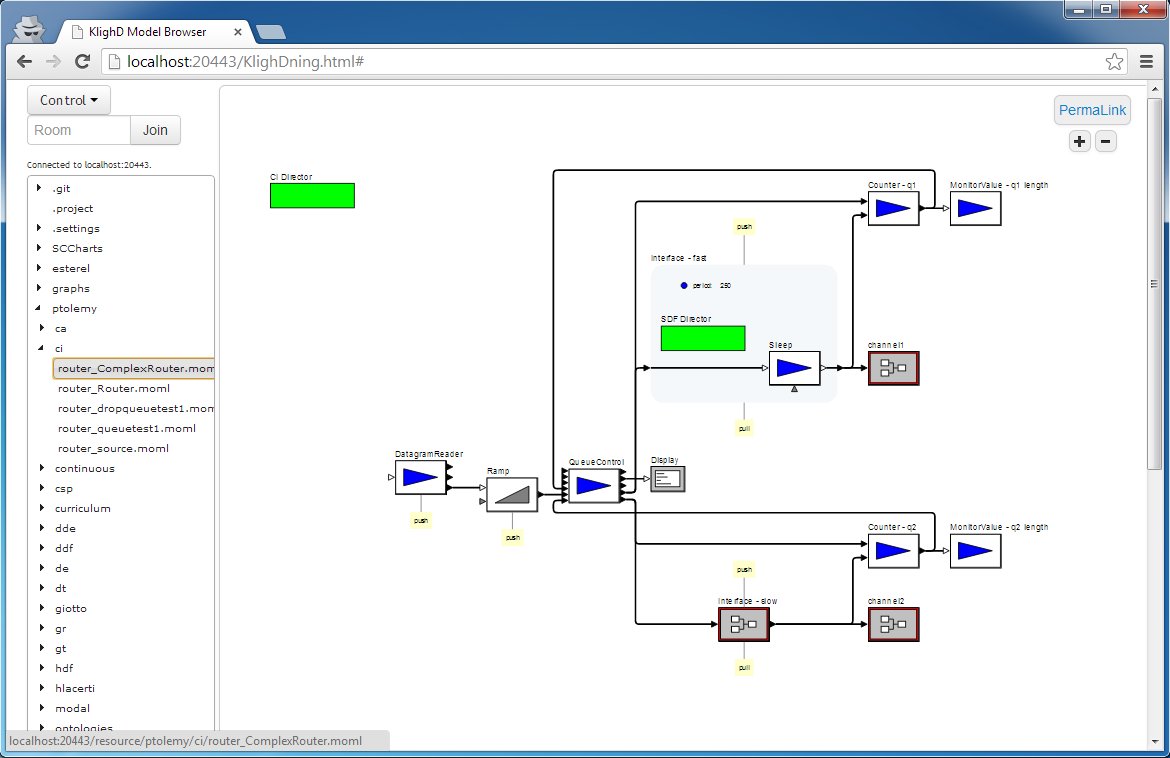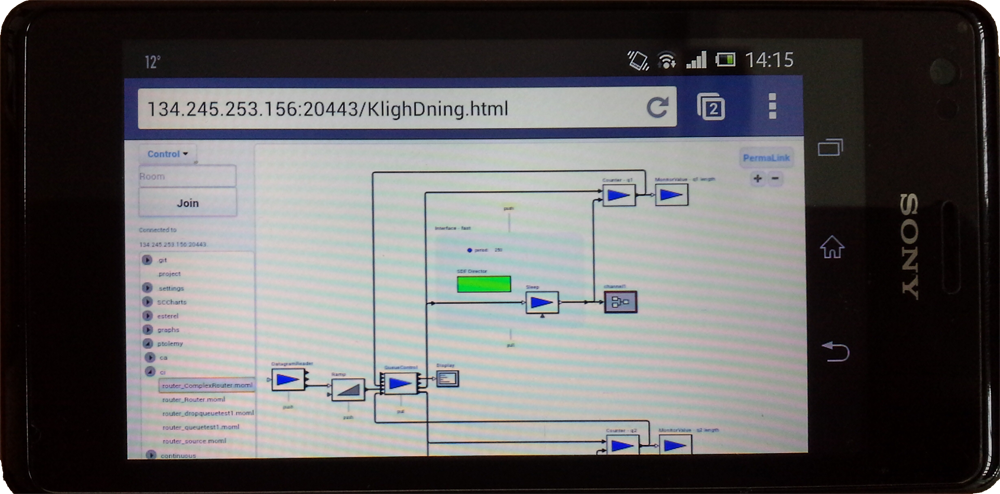Online Model Browsing (KLighDning)
Project Overview
Responsible:
Demo Videos:
The KLighDning project aims at providing a flexible infrastructure to browse arbitrary models. It combines the KlighD technology with web technologies, such as websockets and SVG, to present transiently synthesized diagrams of the models within a webbrowser. KLighDnings focus is browsing model diagrams for documentation purposes, not editing of the models. As part of the documentation idea, basic collaboration facilities are included. Users can join so-called rooms in which the browsing process is synchronized for all participants, for instance, panning, zooming, and expanding of compound nodes.
Details
Supported Models
KLighDning leverages the transient views approach to synthesize diagrams for (purely textual) models. Our implementation KLighD employs the notion of diagram syntheses, which basically are model transformations from an arbitrary source model format to the KGraph format (structural description), where each graph element can be equipped with KRendering elements for styling. See the corresponding wiki pages for further information.
As part of the KIELER Project we currently support following diagram sytheses.
Diagram Type | Short ID | Feature ID |
|---|---|---|
kgraph | de.cau.cs.kieler.kgraph.feature.feature.group | |
ptolemy | de.cau.cs.kieler.ptview.feature.feature.group | |
Ecore Class Diagram | klighd.examples | de.cau.cs.kieler.klighd.examples.feature.feature.group |
Transient Static Links
Permanent links are another facet of the documentation purpose. A user can browse a model to a point where he potentially finds a bug. In order to supplement the bug report a PermaLink can be retrieved that holds the current viewport and expansion status of the user. The link can be attached to the report and upon opening the link, the diagram is opened as specified by the link.
Collaboration
Rooms serve as a basis for collaboratively browsing a model. Users can join a common room in which all browsing activity, i.e., zooming, panning, expanding, is synchronized. One user can explain the model to another, or ask questions about certain details.
Videos
Basic Functionality
Collaboration
Examples
Desktop Webbrowser

Smartphone

Quick Start
- Download a release or nightly build of the KLighDning product.
- Use the install_kieler_features.sh or install_features.sh script to add the desired diagram syntheses.
- Start the server using the start.sh script.
Following a small exemplary deploy script for KLighDning is shown that downloads the current nightly build, extracts it, installs the kgraph and klighd.examples diagram syntheses, and starts the server.
#
# Deploy the KLighDning product and install some features
#
# location of the klighdning product
HOST="http://rtsys.informatik.uni-kiel.de"
SERVER_PATH="/~kieler/files/nightly/klighdning/"
PLATFORM="linux.gtk.x86_64"
FILE="klighdning_nightly_*-${PLATFORM}.zip"
# features to be installed into the klighdning instance
FEATURES="kgraph,klighd.examples"
# local models repository
MODELS_REPO="/home/layout/models"
echo "##################################"
echo "###### Deploying KLighDning ######"
echo ""
echo "Downloading ... "
echo " archive: ${FILE}"
echo " host: ${HOST}${SERVER_PATH}"
wget -r -nd -P tmp -A "$FILE" -I $SERVER_PATH "${HOST}${SERVER_PATH}" 2>/dev/null
echo "Unzipping ..."
cd tmp
unzip -q *.zip
cd ..
mv tmp/klighdning .
rm -rf tmp
echo "Make the scripts executable ..."
chmod u+x klighdning/*.sh
echo "Installing features ..."
cd klighdning
./install_kieler_features.sh "$FEATURES"
echo "Starting KLighDning ..."
./start.sh "$MODELS_REPO"
cd ..